Romanian pianist Dinu Lipatti remains one of the most revered and enigmatic figures in the history of classical music. A prodigious pianist and composer, his career was tragically cut short at the age of 33.
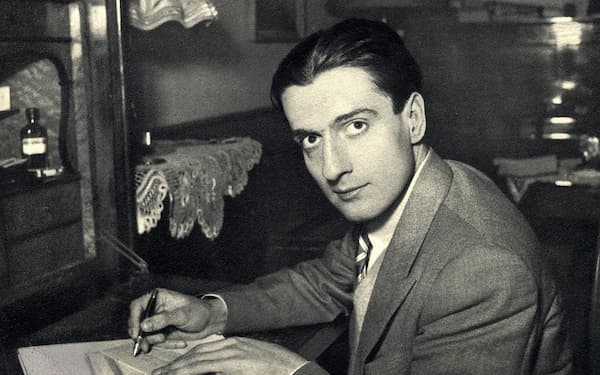
Dinu Lipatti
Lipatti’s life unfolded against a backdrop of personal and historical turbulence, yet he rose to international acclaim, captivating audiences and critics alike. His meticulous preparation, sometimes dedicating years to mastering a single concerto, reflected a dedication that went beyond mere virtuosity. It revealed a musician whose every note carried a sense of purpose and humanity.
His small but extraordinary legacy is preserved in recordings that are frequently described as “pure gold,” and are famed for their technical brilliance, interpretive depth, and emotional resonance. To celebrate his birthday on 1 April, we decided to feature some of his most iconic recordings.
Chopin Piano Concerto No. 1
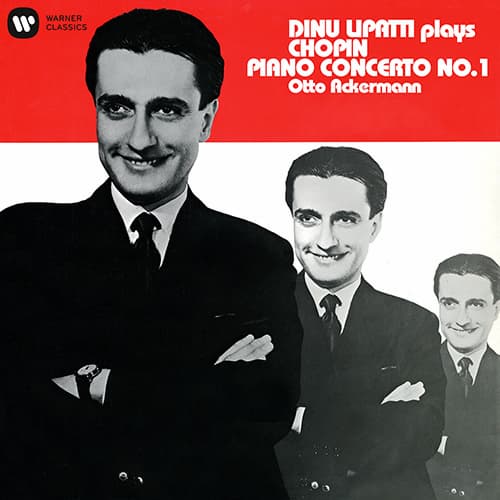
Frédéric Chopin: Piano Concerto No. 1 in E minor, Op. 11 (Dinu Lipatti, piano; Zürich Tonhalle Orchestra; Otto Ackermann, cond.)
For many commentators, Lipatti’s performance of Chopin’s 1st Piano Concerto is a pinnacle of his artistry and a profound testament to his musical genius. It reveals his technical mastery, interpretive insight, and unique ability to imbue Chopin’s Romanticism with classical sensibility. His approach immediately stands out for its architectural lucidity, a hallmark of his playing.
Lipatti’s phrasing is meticulously shaped, with subtle dynamic gradations that highlight Chopin’s melodic contours without exaggeration. His tone is often described as “luminous,” and it never sacrifices warmth for speed. Lipatti never distorts the pulse beyond recognition, as his use of rubato is judicious and organic. Tempering Romantic excess with a Mozartian elegance, the most striking aspect of his Chopin concerto interpretations is surely their emotional resonance.
Bach Partita No. 1
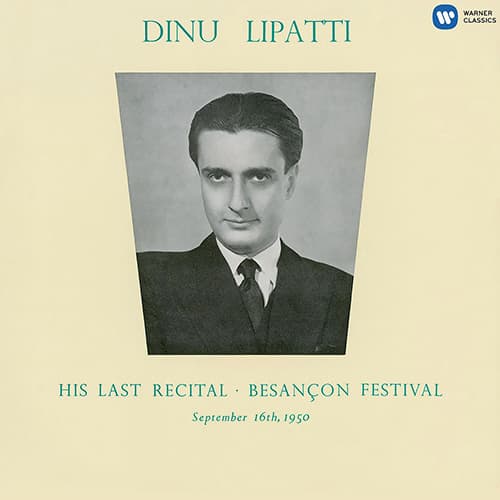
J.S. Bach: Partita No. 1 in B-flat Major, BWV 825 (Dinu Lipatti, piano)
Lipatti’s studio recording of Johann Sebastian Bach’s Partita No. 1 in B-flat Major was made in July 1950 in Geneva during his final recording sessions. It is widely regarded as one of the most exemplary performances of Bach’s keyboard music on the modern piano. Completed just months before his death, it showcases Lipatti’s extraordinary technical precision, interpretive clarity, and a profound ability to balance Baroque structure with a modern sensibility.
Lipatti’s technique is flawless, while his light pedalling is used sparingly for colour rather than sustain to preserve Baroque transparency. His Bach is neither dryly academic nor overly Romantic, as he bridges the historical divide by using the piano’s dynamic range. His crystalline articulation, polyphonic clarity, and restrained expressiveness reveal a musician who sees Bach’s music as a living structure.
Chopin Waltzes
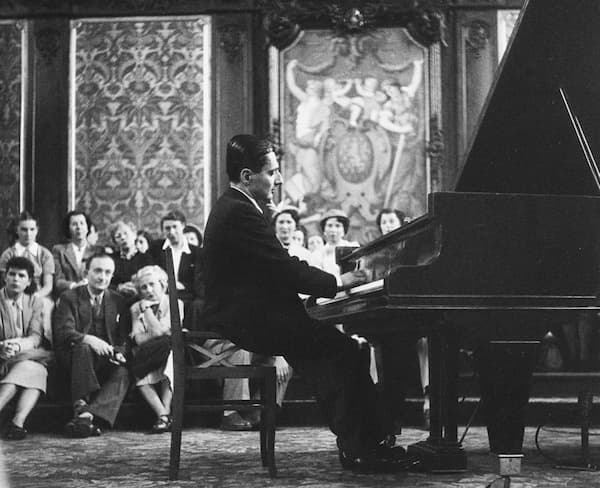
Dinu Lipatti playing at his last recital. Photo: Michel Meusy
Frédéric Chopin: Waltz No. 5 in A-Flat Major, Op. 42 (Dinu Lipatti, piano)
Frédéric Chopin: Waltz No. 7 in C-Sharp Minor, Op. 64, No. 2 (Dinu Lipatti, piano)
Frédéric Chopin: Waltz No. 10 in B Minor, Op. 69, No. 2 (Dinu Lipatti, piano)
Also recorded during his final session in July 1950, Lipatti’s studio recording of the Chopin Waltzes is a cornerstone of his discography and a definitive interpretation of these beloved works. It is a showcase for Lipatti’s unparalleled ability to distill elegance, lyricism, and rhythmic vitality from these dance-inspired miniatures.
Lipatti treats each waltz as a miniature tone poem, balancing its salon charm with deeper emotional currents. His luminous and pearly tone is the product of his light touch and precise voicing, and this tonal beauty lends the recording an ethereal quality. Lipatti transforms these seemingly light pieces into profound musical statements. Recorded when he was mortally ill, this set offers a timeless vision of Chopin’s art for pianist and listeners alike.
Mozart Piano Concerto No. 21
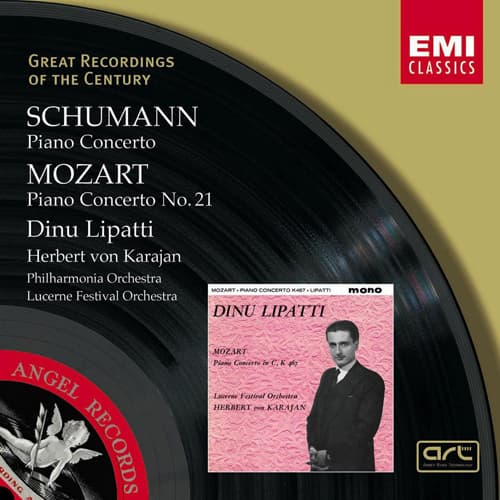
Wolfgang Amadeus Mozart: Piano Concerto No. 21 in C Major, K. 467 (Dinu Lipatti, piano; Lucerne Festival Orchestra; Herbert von Karajan, cond.)
Lipatti’s live performance of Mozart’s Piano Concerto No. 21, recorded on 23 August 1950 at the Lucerne Festival with Herbert von Karajan conducting the Lucerne Festival Orchestra, stands as one of the most celebrated renditions of this work. Recorded just months before his death, his interpretation exemplifies his crystalline tone, classical restraint, and profound musicality, despite battling a severe illness.
Lipatti’s Mozart is quintessentially classical; elegant, proportioned, and free of Romantic indulgence. His ornamentation is crisp and functional, yet always feels organic. For Lipatti, this concerto is a dialogue, striking a balance between solo virtuosity and ensemble cohesion. Lipatti can reveal a Mozart of timeless beauty, and this recording remains a reference point for subsequent generations of pianists.
Schubert Impromptus
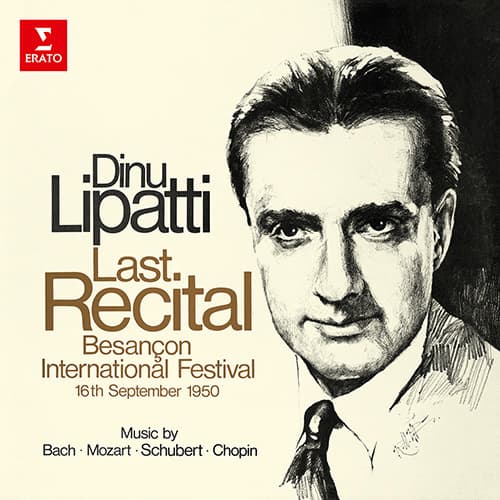
Lipatti’s final recording session also included 2 Impromptus by Franz Schubert. For pianists, critics, and listeners, it represents a pinnacle of his artistry and a profound interpretation of these lyrical works. To be sure, Lipatti’s precise voicing creates a sound that feels both intimate and expansive, with the modern piano taming Schubert’s delicate textures.
Critics often note an “otherworldly” essence, amplified by his physical frailty, that betrays no weakness but only strength of spirit. Recorded under the shadow of death, Lipatti’s Schubert resonates with a timeless humanity, every note a lesson in musical integrity. He turns Schubert’s intimate pieces into transcendent musical statements.
Although Dinu Lipatti’s life was tragically short, his recordings remain a testament to an artistry that transcends time, offering a glimpse of perfection few have matched. His legacy endures, reminding us that even in fragility, the human spirit can create something eternal.
For more of the best in classical music, sign up for our E-Newsletter
Franz Schubert: 4 Impromptus, Op. 90 (excerpts) (Dinu Lipatti, piano)
